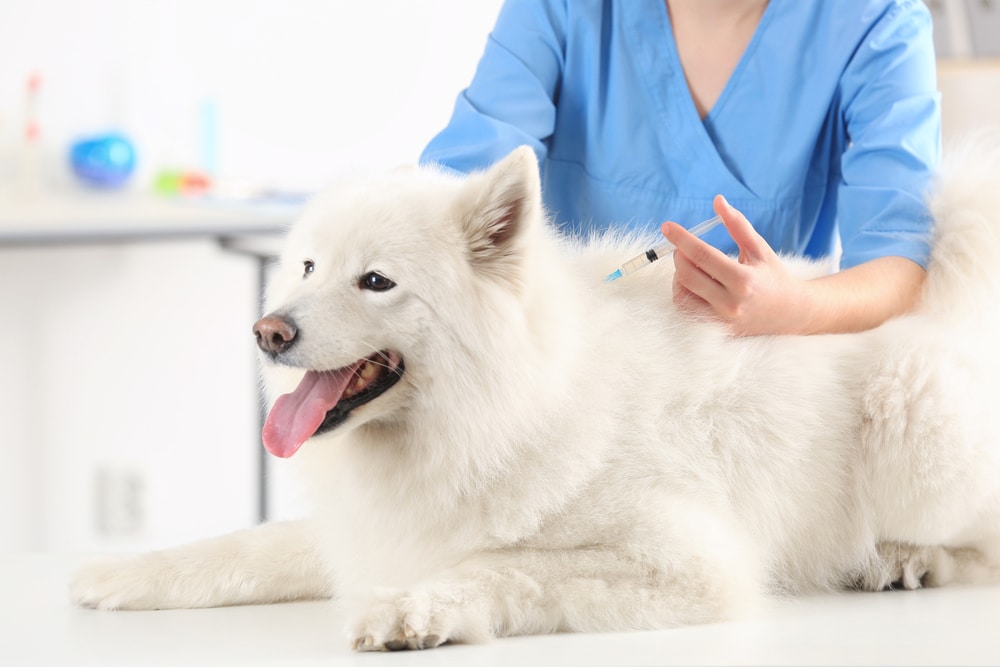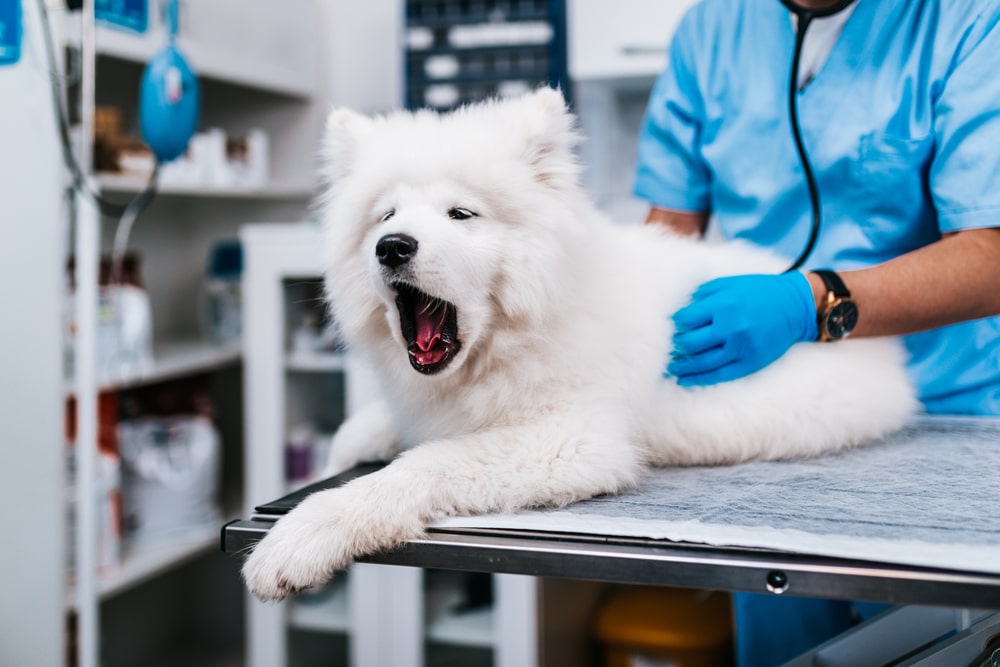As your dog gets older, regular vet checkups become an important part of your life. Some pet parents worry a little too much about their four-legged furry friends and call their vet when they don’t need to. If you want to save yourself and your vet from unnecessary headaches, keep reading and find out our answer to the question, “How often should I take my dog to the vet?”
In general, dogs should have at least one wellness exam per year because this helps to prevent issues. However, the answer varies depending on the dog’s age, breed, lifestyle, and existing health issues. Puppies will need to go at least once a month until their 16 weeks old, then a little less often as suggested by your veterinarian, dogs 1-8 years old will need to go at least once a year, and senior dogs will need to go at least twice a year.
Table of Contents
What Is an Annual Vet Exam?

Even though your dog seems perfectly healthy, an annual wellness exam might significantly improve your dog’s health.
An annual vet exam is a general health assessment done by a veterinarian that might include a physical exam, parasite preventative measures, blood tests, and urinalysis.
During your visit, the doctor will check the dogs’ visible mucose membranes, including the gums and eyes, and perform a stethoscope and otoscope examination. Throughout this exam, the vet will ask about the dogs’ age, breed, diet, exercise, behavior, daily habits, and general health.
Taking your dog regularly to a vet will reduce the chances of unwanted health issues and keep your dog healthy and happy. You may worry about the vet visit costs but bear in mind that preventive measures might save you money while keeping your four-legged furry friend healthy.
In general, the annual wellness exam is a great chance to track your dog’s overall health.
Puppy Vet Visits
A well-known fact is that newborn puppies are sensitive to many environmental factors. Therefore, taking your puppy regularly for vet check-ups is crucial.
During these vet visits, pet owners gain knowledge about their puppy’s health, nutrition, disease prevention, training, and socialization. The abovementioned factors are super important components of a healthy and well-behaved puppy.
Before adopting a puppy, make sure you have all the information from the breeder or the shelter. However, after doing this, we suggest that you book an appointment with a vet that will perform a wellness check-up.
Your vet will provide you with information about the recommended vaccines that prevent the spreading of life-threatening diseases.
The American Animal Hospital Association (AAHA) recommends the following vaccines: distemper, hepatitis, leptospirosis, parvo, and parainfluenza (also known as DHLPP).
After the first dose of the vaccine, you should bring your puppy to the vet every 4 weeks for a booster shot until it turns 16 weeks old. Then, when your puppy is 3-4 months old, it should receive a rabies vaccine. On top of this, depending on your geolocation, your vet will suggest some optional vaccines such as Bordetella, Lyme disease, and Canine flu.
Additionally, during these vet visits, you will get recommendations for flea and tick prevention, and you can discuss some elective surgical procedures such as spaying and neutering.
Once your vet gets to know your puppy, they will suggest the best timing for these procedures. However, you can expect it to be somewhere between the 6th and 24th month of age.
Believe me, you will get tired of seeing your vet so often during the first year of your puppy, but it’s worth it to keep your dog as safe and healthy as possible.
Adult Dog Vet Visits
Dogs from 1 to 8 years old are considered adult dogs. However, this doesn’t mean they know how to care for themselves. Annual dog visits are still obligatory. In case your dog is perfectly healthy, one exam per year is enough.
Conversely, your dog’s breed might require more frequent vet visits. If you are a dog owner, you are probably familiar with the fact that some dog breeds are more prone to some diseases, for example, so knowing as much as you can about your breed of dog is key to giving them the best life possible.
Adult dogs need booster shots for rabies and DHLPP vaccines every 1-3 years. Again, depending on your geolocation, the dog might need an extra vaccine for some of the previously mentioned diseases.
During this age, dogs might develop some infections that might spread through the whole body, so it is essential to prevent such issues and keep them in good shape. For example, even a minor mouth infection can spread throughout internal organs such as the stomach or liver and cause serious damage if left untreated.
Believe it or not, dental issues are a common health problem in adult dogs. Brushing the dog’s teeth is not as easy a procedure as it seems. So, over time they face issues with tooth decay and tartar.
Fortunately, dental health issues can be quickly resolved, and your vet’s office is the right place to look for answers.
Additionally, your vet will perform a tail-to-nose exam, check for any bumps or lumps, and perform blood tests, fecal exams, and urinalysis to check if there is a need for further investigation.
Senior Dog Vet Visits
Unlike puppies and adult dogs, senior dogs need at least two checkups per year. This is because old dogs are more prone to injuries and life-threatening issues. So, regular vet visits can help you prevent any issue before it occurs.
As per usual, your vet will perform a tail-to-nose and physical exam and will pay additional attention to some areas. In this case, your vet will most likely check if there are any mobility, dental, or internal organ issues. You will also get suggestions for parasite control or vaccine boosters if there is a need.
First-time dog parents might get exhausted because of the frequent vet visits. Ultimately, remember that you are doing this for the creature that made your life better for years.
What Does the Vet Check During a Physical Examination?
As soon as you enter the vet office, be prepared for tons of questions. Your vet needs to know your dog’s previous health history to help determine any abnormalities. Some vets will even ask you to bring fresh urine and feces samples to complete the examination. So, don’t be surprised if they ask; this is a normal process that every pet parent has to get through.
The physical examination usually includes the following:
- Weighing your dog
- Checking its stance and gait
- Examination of feet and nails
- Listening to your dog’s lungs and heart with a stethoscope
- Checking for lumps, parasites, and any skin abnormalities
- Inspecting your dog’s coat
- Ocular and ear examination
- Dental check-up
- Palpation throughout the whole body and checking for signs of discomfort
Some vets will even perform this physical examination during a conversation with you, so you might not even notice it. No matter how simple it sounds, this is a great way to discover any health concerns.
Which Vaccines Do Dogs Need Every Year?
Vaccination is the best way to protect your dog from unwanted health issues. Vaccines can be separated into two groups: core and non-core vaccines.
Core vaccines include:
- Canine parvovirus
- Distemper
- Hepatitis
- Rabies
On the other hand, non-core vaccines that some doctors recommend are:
- Bordetella bronchiseptica
- Borrelia burgdorferi
- Leptospira bacteria
For any additional concerns, please discuss them with your vet.
When to Take Your Dog to the Vet Right Away?
Although some vets practice the “wait and see approach”, there are many cases when your dog needs to see a vet as soon as possible.
After our in-depth research, we’ve made a list of dog emergencies that need immediate care.
You should look for immediate care in case of the following:
- Your dog had a recent trauma and can’t move its legs
- It has seizure attacks
- It’s in pain
- It’s unconscious
- It has a visible injury
- You suspect your dog ate something poisonous
- Your dog has breathing issues, vomiting, or diarrhea
- Your dog bleeds
In the end, you know your dog more than anyone. So, it is up to you when the time is right to ask for professional help.
To Sum Up: How Often Should I Take My Dog To The Vet?
Now that we’ve gone through everything for, “How often should I take my dog to the vet?” we hope you feel more comfortable about when to take your dog to the vet.
Now, we’re curious about what you think. How often do you call your vet? Let us know your thoughts and why in the comments section below!
